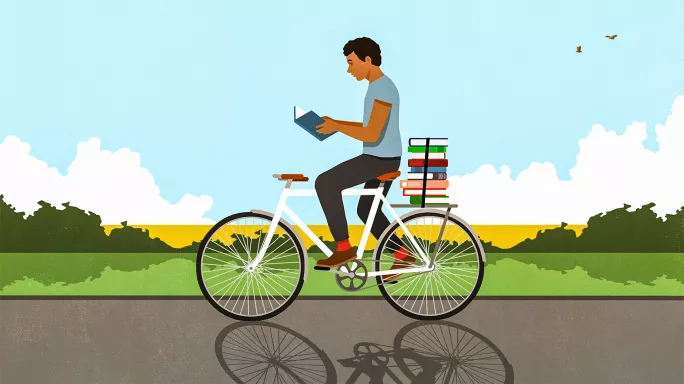
- Home
- Teaching & Learning
- Secondary
- 4 ways to ensure GCSE English promotes reading for pleasure
4 ways to ensure GCSE English promotes reading for pleasure

âItâs happening more than it used to,â says Dr Andrew McCallum, director of the English and Media Centre, âand it is causing some students to miss out.â
McCallum is talking about a theoretical shift happening in English classrooms: a move away from teaching literature through reading whole texts and towards studying small extracts of novels instead.
âWe regularly hear from parents of key stage 3 students that their children are not studying whole texts but moving from extract to extract,â McCallum says.
The idea is that this allows students to practise their literary analysis skills in a more manageable way amid curriculum pressures, although some have raised concerns about the wider impact the approach is having on studentsâ reading beyond English lessons.
Students struggling to read entire books
Writing in The Atlantic, journalist Rose Horowitch recently that academics at some of the USâ most elite universities are finding that their students struggle to read entire books, as they have never been required to do this before.
According to McCallum, teaching through extracts risks reducing literature to âa sort of adjunct of teaching languageâ, in which students are asked to focus on the minutiae of a text in a way that develops the âimportant skill of close reading, but forgets about the text itselfâ.
The suggestion from some parties is that this can have a disastrous effect on studentsâ motivation to read for pleasure, at a time when young peopleâs reading enjoyment is already at a low. The latest survey from the found that just 32.7 per cent of young people aged 8 to 18 said they enjoyed reading in their free time in 2025 - the lowest this figure has been in 20 years.
But is studying too many extracts really behind a generation of young people who struggle to find the stamina to read whole books, and have little interest in doing so?
Using literature extracts effectively
Dr Sarah Mullin MBE is a deputy headteacher, a former head of English and a visiting professor of education. She says that, in her experience, in most English classrooms students do tend to study books in their entirety, at least some of the time.
This is in line with the requirements of the national curriculum, which stresses the importance of reading whole books or texts at both KS3 and KS4.
Time is âobviously an issueâ, Mullin says, which may mean that students are sometimes given extracts to read at home or that chapters may be summarised for ease of learning.
However, she is not convinced this practice is damaging. She gives the example of a supposedly âchallengingâ text, like a Shakespeare play. Itâs not about whether you use extracts or read the text in its entirety, but rather âall about how you teach it, and how you design your curriculumâ, she says.
In other words, there are ways to use extracts effectively without stripping students of the motivation to read.
What, then, can schools do to make sure they continue to promote reading for pleasure, even when time and complexity dictate that extracts might sometimes need to be used?
1. Reconsider your text choices
Overuse of extracts often happens when schools focus too much on teaching dense, literary heritage texts, suggests Samantha Wharton, an English teacher at St Angelaâs Ursuline School in East London and educational content creator for Lit in Colour.
âWe used to do Great Expectations for GCSE, but the books weâve chosen now are more manageable,â explains Wharton.
She points out that there are only âseven hours of English teaching across a two-week periodâ in her schoolâs timetable, and while teachers do allow students to take their books home to read, the amount of lesson time available has to be factored in when selecting class texts.
If you need to get through, say, over 500 pages of Great Expectations, youâre going to need to dedicate an awful lot of classroom time to reading it, unless you rely heavily on extracts and summaries.

Lewis Goodacre is an English teacher and subject lead at Acland Burghley School in Camden, London. His department has, likewise, reconsidered the titles theyâre teaching.
âI feel like if you want children to read, you have to give them an interesting story,â Goodacre says. âOne of the ways to galvanise reading in schools is to read whole books and [allow students to] experience the embodied processes of reading.â
That means choosing engaging texts, he continues, but not necessarily less challenging ones. For example, the first book that Year 7 read at his school is In The Sea There Are Crocodiles by Fabio Geda, which is a novel based on the true story of an Afghan refugee who recounts his journey from Afghanistan to Italy.
This book is not âa canonical Victorian novelâ, Goodacre points out, but it is still âincredibly complex in its subject matter and narrative structureâ.
In fact, Goodacre pitched the book, published in 2010, to his department as a replacement for A Christmas Carol, on the grounds that itâs âjust as challenging and just as worthwhile, but in different waysâ than Dickens.
2. Avoid early exam preparation
One of McCallumâs concerns about the use of extracts is that it takes away some of the enjoyment of studying literature, which he believes feeds into a bigger problem around the subjectâs declining popularity.
Where English used to be âthe subject that most kids really likedâ, the number of students opting to study English at A level (either literature or language and literature) is now in decline.
According to research from Rachel Roberts, associate professor of secondary English education at the University of Reading, the number of A-level English entries dropped from 83,000 in 2013 to 54,000 in 2023. She cites the issue of GCSE texts âbleeding downâ into KS3 as a factor.
Take Othello. Shakespeareâs tale of sexual jealousy and racism was a popular A-level text in previous generations but is now commonly covered in Year 7 or 8, McCallum explains, despite it being âtotally unsuitable for that age groupâ.
Too often, he says, students are being âdragged through canonical fiction in KS3, totally unnecessarily, in this bogus belief that that will help them when theyâre doing A Christmas Carol or Strange Case of Dr Jekyll and Mr Hyde ±ôČčłÙ±đ°ùâ.
The trouble, he continues, is that this means students âcanât actually develop the skills of literary analysis because the texts are too hardâ for them to engage with cognitively.
Pushing GCSE content down the key stages, he says, can therefore, ultimately, be counterproductive.
3. Prioritise subject-specific pedagogy
However, while placing too much emphasis on exam preparation too soon can be problematic, Mullin believes that younger children are still able to ârise to the challengeâ of delving into the literary canon at an early age, as long as their learning is scaffolded in an age-appropriate way.
âIf youâre studying Shakespeare, your focus for that year might be just the context or the dramatic side of it. You have to know what you want the children to get out of it at the end,â she explains.
This takes careful curriculum planning and a sound grasp of English-specific pedagogy, which is a challenge if you have non-specialists teaching the subject.
âItâs very hard to get really good English teachers at the moment,â Mullin points out. âIf youâve got somebody covering, even if itâs a long-term supply teacher, will they really have engaged with the text in as much depth as the children need? You want staff to enjoy and get excited about texts [and say], âOh my God, itâs my favourite bit,â rather than, âToday weâre focusing on sentence structure,â and itâs just death by analysis.â

For Goodacre, the problem of teacher recruitment and retention in the subject overlaps with issues of teacher autonomy and the use of pre-prepared lessons.
âWith [some] academies, itâs almost like a factory line,â he says. âThey want all teachers delivering the same lessons, which have been planned by somebody else, in a very particular way.â
Itâs an approach that he feels can âde-professionaliseâ English teachers, overlooking the fact that âprofessional trust and agencyâ provide âa lot of the jobâs satisfactionâ. Goodacre believes that having a motivated teacher can go a long way towards instilling the love of reading that English departments are so keen to cultivate.
4. Broaden understanding of what a âwhole textâ means
Ultimately, enjoyment has to be a factor when we are thinking about how to promote reading for pleasure, suggests Dr Judith Kleine Staarman, senior lecturer in education at the School of Education at the University of Exeter. She believes this has little to do with whether extracts are used or not.
âThe biggest worry is that students are not enjoying reading,â she says. âThatâs a bigger issue than whether they are reading large chunks of text or breaking their text up into smaller bits.â
Debates over the use of extracts are a distraction, she believes, and tend to adhere to an âelitist, slightly old-fashioned view of what reading isâ.
âReading now comes in many different formats and many different modes, using different technologies, which are not necessarily worse [than physical books],â Kleine Staarman explains.
For instance, the National Literacy Trust found that audiobooks have among young people, with 42.3 per cent reporting that they enjoyed listening to audio texts in 2024, the figure overtaking enjoyment of reading written texts (34.6 per cent) for the first time.
So, could it be useful for schools to expand their understanding of what a âwhole textâ looks like, to include multi-modal sources, such as audiobooks?
âI havenât seen research on the specific impact of audiobooks, but I do think a lot of the comprehension skills that you would pick up through reading, you would also pick up through listening to an audiobook,â Kleine Staarman says.
âThere are lots of different ways of engaging in reading, and whether children are reading a book or a poem or a song lyric or a short story or non-fiction, what matters the most is that they enjoy it.â
Growing popularity of âBookTokâ
Freddie Baveystock, an A-level English teacher at Harris Westminster Sixth Form in London and a former university lecturer in literature, agrees. Despite common concerns about studentsâ use of social media and screen time, he points to the growing popularity of âBookTokâ.
This is a community based on the social media app TikTok, in which users share videos about the books they are reading.
BookTok is awash with teenage influencers, so it has the power to âreach a lot of young peopleâ.
âIt has definitely impacted some of them and made reading a fashionable thing. Iâve seen evidence of reading being really prized among students,â Baveystock says.
For instance, he remembers a recent A-level class that became competitive about reading âincredibly obscure literary novelsâ as a result of their involvement in BookTok.
âThey clearly really enjoyed the connection to a sense of literary culture and discovering that they could be part of that,â he says. âItâs a small story, but itâs one that feels worth telling. Itâs anecdotal, but itâs not all doom and gloom.â
Zofia Niemtus is a freelance writer
You can now get the UKâs most-trusted source of education news in a mobile app. Get Tes magazine on and on
Want to keep reading for free?
Register with Tes and you can read five free articles every month, plus you'll have access to our range of award-winning newsletters.
Register with Tes and you can read five free articles every month, plus you'll have access to our range of award-winning newsletters.
Keep reading for just ÂŁ4.90 per month
You've reached your limit of free articles this month. Subscribe for ÂŁ4.90 per month for three months and get:
- Unlimited access to all Tes magazine content
- Exclusive subscriber-only stories
- Award-winning email newsletters
You've reached your limit of free articles this month. Subscribe for ÂŁ4.90 per month for three months and get:
- Unlimited access to all Tes magazine content
- Exclusive subscriber-only stories
- Award-winning email newsletters
topics in this article



